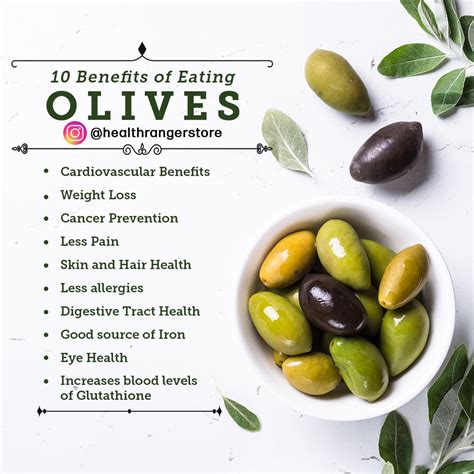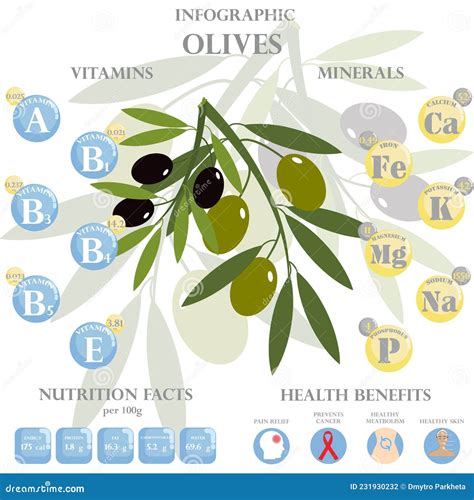Intro
Discover the nutritional benefits of olives, rich in antioxidants, healthy fats, and vitamins, boosting heart health and digestion, making them a nutritious addition to a balanced diet.
Olives have been a staple in Mediterranean cuisine for centuries, and their popularity has spread globally due to their unique flavor and potential health benefits. With the increasing awareness of healthy eating and wellness, many people are curious about the nutritional value of olives and whether they can be a beneficial addition to their diet. In this article, we will delve into the world of olives, exploring their history, nutritional profile, and the scientific evidence supporting their potential health benefits.
The history of olives dates back to ancient civilizations, where they were not only a food source but also used for medicinal and ceremonial purposes. Today, olives are enjoyed in various forms, from green olives to black olives, and are often used as a topping for pizzas, salads, and sandwiches. But beyond their culinary uses, olives have been found to possess a range of bioactive compounds that may contribute to their potential health benefits. From reducing inflammation to supporting heart health, the advantages of consuming olives are numerous and backed by scientific research.
As we explore the world of olives, it's essential to understand the different types and their unique characteristics. From Kalamata to Manzanillo, each variety of olive has its distinct flavor profile and nutritional content. By examining the various types of olives and their production processes, we can gain a deeper appreciation for the craftsmanship and dedication that goes into creating these delicious and potentially healthy foods. Whether you're a seasoned olive enthusiast or just discovering the joys of olives, this article will provide you with a comprehensive overview of the health benefits and culinary uses of olives.
Introduction to Olives

Nutritional Profile of Olives
Olives are a nutrient-rich food, providing a range of essential vitamins, minerals, and antioxidants. They are an excellent source of healthy fats, particularly monounsaturated fats, which have been shown to support heart health. Olives are also rich in fiber, vitamins E and K, and minerals like calcium and iron. The antioxidant properties of olives are due to the presence of polyphenols, which have been found to have anti-inflammatory and anti-cancer effects.Health Benefits of Olives

Olives and Heart Health
The relationship between olives and heart health is well-established, with numerous studies demonstrating the potential benefits of olive consumption on cardiovascular health. The monounsaturated fats present in olives have been shown to lower total cholesterol and LDL ("bad") cholesterol levels, while also improving blood lipid profiles. Additionally, the antioxidants and polyphenols in olives may help to reduce inflammation and improve blood vessel function, further supporting heart health.Culinary Uses of Olives

Types of Olives
There are numerous varieties of olives, each with its unique flavor profile and texture. Some of the most popular types of olives include: * Kalamata: a Greek olive variety known for its dark purple color and rich, fruity flavor * Manzanillo: a Spanish olive variety with a crisp texture and slightly sweet flavor * Green olives: typically harvested when unripe, these olives are often used in martinis and as a topping for salads * Black olives: ripe olives that have been cured to bring out their natural sweetness and depth of flavorOlives and Nutrition

Olives and Antioxidants
The antioxidant properties of olives are due to the presence of polyphenols, which have been found to have anti-inflammatory and anti-cancer effects. Some of the key antioxidants present in olives include: * Oleuropein: a polyphenol with anti-inflammatory and antioxidant properties * Hydroxytyrosol: a polyphenol with antioxidant and anti-cancer effects * Tyrosol: a polyphenol with antioxidant and anti-inflammatory propertiesOlives and Cancer Prevention

Olives and Cognitive Function
The potential cognitive benefits of olives are due to the presence of antioxidants and polyphenols, which have been shown to reduce the risk of neurodegenerative diseases. Some of the key ways in which olives may help to support cognitive function include: * Reducing inflammation and oxidative stress in the brain * Improving blood flow to the brain * Enhancing the growth and survival of neurons * Reducing the risk of age-related cognitive declineOlives and Weight Management

Olives and Digestive Health
The potential digestive benefits of olives are due to their high fiber content, which can help to regulate bowel movements and prevent constipation. Some of the key ways in which olives may help to support digestive health include: * Promoting the growth of beneficial gut bacteria * Reducing inflammation and improving gut barrier function * Enhancing the absorption of nutrients * Reducing the risk of digestive disorders such as IBS and diverticulitisConclusion and Final Thoughts

We invite you to share your thoughts and experiences with olives in the comments section below. Have you incorporated olives into your diet and noticed any health benefits? Do you have a favorite type of olive or recipe that features olives as a main ingredient? By sharing your knowledge and expertise, we can create a community of like-minded individuals who are passionate about healthy eating and wellness.
What are the health benefits of eating olives?
+Olives have been shown to have numerous health benefits, including reducing inflammation and improving heart health, supporting cognitive function, and aiding in weight management.
How do I incorporate olives into my diet?
+Olives can be used in a variety of dishes, from appetizers to main courses. Try using them as a topping for pizzas and salads, or adding them to soups and stews for added flavor and nutrition.
What are the different types of olives?
+There are numerous varieties of olives, each with its unique flavor profile and texture. Some of the most popular types of olives include Kalamata, Manzanillo, green olives, and black olives.
Can olives help with weight management?
+Yes, olives may help with weight management due to their high fiber and water content, which can help to reduce hunger and increase feelings of fullness.
Are olives a good source of antioxidants?
+Yes, olives are a rich source of antioxidants, including polyphenols and vitamin E, which can help to reduce inflammation and oxidative stress in the body.
